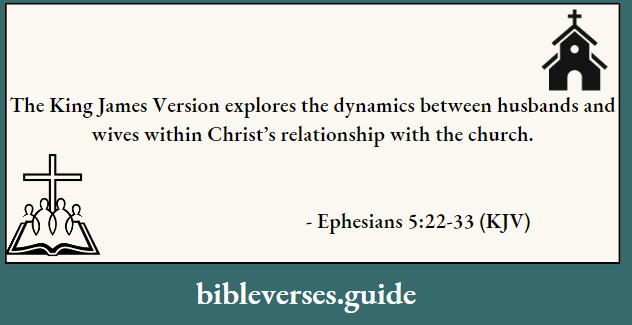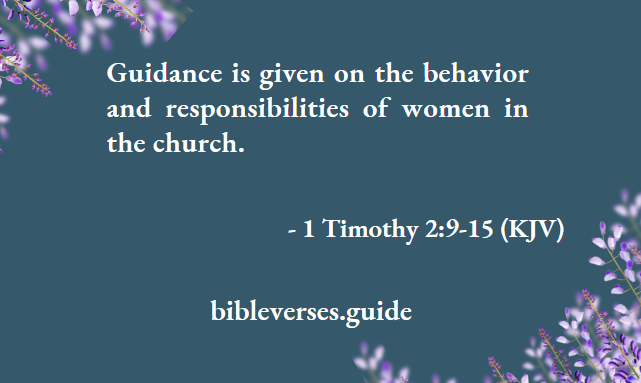“22 Wives, submit yourselves unto your own husbands, as unto the Lord.
23 For the husband is the head of the wife, even as Christ is the head of the church: and he is the Saviour of the body.
24 Therefore as the church is subject unto Christ, so let the wives be to their own husbands in everything.
25 Husbands love your wives, even as Christ also loved the church, and gave himself for it;
26 That he might sanctify and cleanse it with the washing of water by the word,
Read and Learn More Empowering Bible Verses For Women
27 That he might present it to himself a glorious church, not having spot, or wrinkle, or any such thing; but that it should be holy and without blemish.
28 So ought men to love their wives as their own bodies. He that loveth his wife loveth himself.
29 For no man ever yet hated his own flesh; but nourisheth and cherishes it, even as the Lord the church:
30 For we are members of his body, of his flesh, and of his bones.
31 For this cause shall a man leave his father and mother and shall be joined unto his wife, and they two shall be one flesh.
32 This is a great mystery: but I speak concerning Christ and the church.
33 Nevertheless let every one of you in particular so love his wife even as himself, and the wife sees that she reverence her husband.”
Ephesians 5:22-33 (KJV)

Let’s delve into the key points:
Wives’ Submission: The passage initiates by advising wives to submit to their husbands, drawing a parallel between this act of submission and the church’s submission to Christ. This submission is portrayed as voluntary, done “as unto the Lord.”
It’s crucial to understand that this submission is not about inferiority or dominance but about fostering a relationship of mutual respect and love within marriage.
Husband’s Love: Conversely, husbands are urged to love their wives sacrificially, mirroring Christ’s love for the church by giving Himself up for her. This love is characterized by selflessness, dedication, and a readiness to prioritize the well-being and development of their spouse.
Husbands are called to exemplify Christ’s love for the church through their love for their wives.
Christ-Church Analogy: The passage draws comparisons between the dynamics of marriage and the relationship between Christ and the church. Just as Christ is the head of the church and loves sacrificially, husbands are to be the heads of their households and similarly love their wives.
This analogy underscores the profound spiritual significance of marriage and the divine example it reflects.
Oneness In Marriage: The passage stresses the unity and intimacy inherent in marriage, describing the union of husband and wife as “one flesh.” This union is so profound that it mirrors the mystical bond between Christ and His church, highlighting the sacred and enduring nature of the marital connection.
Respect And Reverence: Lastly, wives are encouraged to show respect and reverence towards their husbands. This respect is grounded in recognizing the husband’s role as the leader and provider within the family unit.
Ephesians 5:22-33 presents a framework for marital relationships anchored in mutual love, respect, and sacrificial devotion. It underscores the profound spiritual significance of marriage as a reflection of Christ’s love for His church. It calls husbands and wives to embody Christ-like virtues in their respective roles within marriage.
Points To Ponder:
Mutual Respect And Love: The passage advises wives to submit to their husbands while highlighting the importance of husbands showing sacrificial love for their wives. This mutual respect and love acknowledge the value and dignity of wives, as husbands are expected to love their wives as Christ loved the church.
This mutual respect and love reinforce the importance of each partner in the marital relationship.
Partnership In Marriage: Although the passage mentions the husband’s role as the head of the household, it stresses the unity and oneness of marriage. Wives are seen as equal partners rather than mere subordinates in the marital journey. Their voices, opinions, and contributions are respected and valued within the marriage.
Spiritual Equality: Drawing parallels between the Christ-church relationship and the husband-wife relationship, the passage underscores the spiritual equality of men and women.
Husbands are called to love and care for their wives sacrificially, mirroring Christ’s love for the church. This recognition of spiritual equality encourages us to embrace our identity as beloved daughters of God, deserving of love and respect.
Shared Responsibility For Growth: While husbands are tasked with being spiritual leaders in their homes, wives are encouraged to support and uplift their husbands in their faith journey.
This shared responsibility for spiritual growth enables us to actively engage in the spiritual life of their families and communities, contributing our unique gifts and perspectives to the collective faith journey.
Freedom in Christ: Ephesians 5:22-33 underscores women’s freedom and agency in Christ. Despite outlining marital roles and responsibilities, the passage upholds women’s autonomy and self-worth. We are empowered to live out our faith authentically, knowing that their value and identity are rooted in Christ alone.
Ephesians 5:22-33 recognizes our worth, dignity, and equality within marriage. It encourages us to embrace our roles as partners, supporters, and collaborators in the faith journey, emphasizing that our value and significance lie in our relationship with Christ.
“9 In like manner also, that women adorn themselves in modest apparel, with shamefacedness and sobriety; not with broided hair, or gold, or pearls, or costly array;
10 But (which becometh women professing godliness) with good works.
11 Let the woman learn in silence with all subjection.
12 But I suffer not a woman to teach, nor to usurp authority over the man, but to be in silence.
13 For Adam was first formed, then Eve.
14 And Adam was not deceived, but the woman being deceived was in the transgression.
15 Notwithstanding she shall be saved in childbearing if they continue in faith and charity and holiness with sobriety.”
1 Timothy 2:9-15 (KJV)

Here are the critical points dissected:
Modesty In Dressing (Verses 9-10): The passage advises women to dress modestly, focusing on inner virtues rather than outward appearances like fancy hairstyles, jewelry, or expensive attire. The emphasis lies on embodying godliness and virtue through good deeds.
Silent Learning (Verse 11): Women are instructed to learn quietly and submissively. This reflects the cultural norms of that era, where teaching and education were primarily reserved for men. Women were expected to learn in silence and respect, deferring to male authority figures.
Restrictions On Teaching And Authority (Verse 12): Women are not permitted to teach or have authority over men in the church but are to be silent. Interpretations vary, with some viewing it as a universal ban on women’s leadership roles and others as specific to the cultural context of the early church in Ephesus.
Biblical Basis (Verses 13-14): Paul supports his guidance with references to the creation story, highlighting the sequence of Adam’s creation before Eve and Eve’s deception in the Garden of Eden. This basis indicates that Paul’s instruction is grounded in theological principles rather than cultural norms.
Salvation Through Childbearing (Verse 15): The passage concludes with a verse open to interpretation, suggesting that women will find salvation through childbearing if they continue in faith, love, holiness, and self-control. Views on this vary, with some seeing it as a reference to bearing the Messiah and others to the nurturing role of motherhood in fostering faith in future generations.
1 Timothy 2:9-15 offers guidance on women’s behavior and roles in the church, reflecting the cultural context of the time and theological principles related to gender and authority within the Christian community.
Understanding these verses necessitates careful consideration of their historical context and broader biblical teachings on gender, equality, and ministry within the church.
Points to Ponder:
Focus On Inner Virtue (Verses 9-10): The passage encourages us to adorn ourselves with modesty and good works, emphasizing the value of inner character over outward appearance. This empowers us to cultivate humility, kindness, and integrity, enduring and reflective of our identity as beloved daughters of God.
Opportunity for Learning (Verse 11): While the instruction for women to learn in silence and submission may seem restrictive, it also acknowledges our right and responsibility to engage in learning and spiritual growth. We are encouraged to seek knowledge and wisdom, albeit in a manner that respects the authority structures within the church community.
Respectful Engagement (Verse 12): Although the passage restricts women from teaching or exercising authority over men in the church, it also underscores the importance of respectful engagement within the community. We are called to contribute to the church’s life in ways that honor God’s order and promote unity while still recognizing the value of our insights and contributions.
Biblical Understanding (Verses 13-14): The references to the creation narrative and Eve’s deception provide a theological basis for Paul’s instructions. While these verses have been interpreted in various ways, they affirm the significance of women within God’s redemptive plan and invite us to engage with Scripture in a deeper and more nuanced manner
Spiritual Growth and Service (Verse 15): The passage concludes with a challenging verse that speaks of salvation through childbearing. While this verse has been subject to interpretation, it underscores the importance of faith, love, holiness, and self-control in our lives as women.
It reminds us that our spiritual growth and service to God are not limited by societal expectations or roles but are grounded in our relationship with Christ
While 1 Timothy 2:9-15 contains instructions that may seem limiting or challenging, it also offers opportunities for empowerment and growth as women of faith. By embracing the virtues of modesty, learning, respectful engagement, biblical understanding, and spiritual service, we can find strength and purpose in fulfilling our calling as followers of Christ within the church and beyond.
